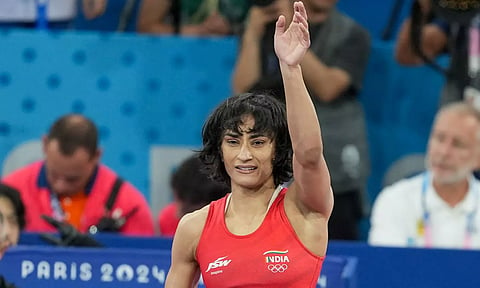

CHENNAI: In the annals of sporting history, the names of many athletes have been etched not only for their victories but also for the heartbreaking moments that denied them glory. One such tale is that of Vinesh Phogat, a wrestler whose dreams of Olympic gold were dashed by a mere 100 grams. The stringent rule that mandates a wrestler’s weight to be taken before and after a match without exceeding the category limit by even a fraction has come under severe scrutiny for its inhuman, archaic, and brutal nature.
Vinesh Phogat, competing in the 50-kg category, found herself on the wrong side of an outdated rule. Despite her rigorous training, impeccable technique, and unmatched spirit, she was disqualified for exceeding the weight limit by just 100 grams after her match. This minor excess, caused by factors beyond her control, such as fluid retention and the body’s natural response to intense physical exertion, denied her the chance to compete for the ultimate prize. Is it reasonable to demand such precise control over a human body, which is not a machine but a complex, dynamic organism?
The rule requiring wrestlers and boxers to adhere strictly to weight categories, with no margin for error, dates back to an era when scientific understanding of the human body was limited. Modern sports science acknowledges that weight can fluctuate due to numerous factors, including hydration levels, hormonal changes, and even stress. Yet, the regulations remain unchanged, ignoring the advancements in our knowledge of human physiology.
In contrast, other sports have adapted their rules to accommodate the realities of the human body better. For instance, weightlifting allows athletes to weigh in several hours before their competition, recognizing that dehydration and other weight management strategies can adversely affect immediate post-weigh-in performance. This flexibility ensures a fairer and healthier competition.
Vinesh Phogat’s case is not an isolated incident. There are numerous examples where athletes have been unfairly disqualified due to minor weight discrepancies:
Kelsey Campbell - An American wrestler missed her weight category by 0.1 kilograms during the 2012 US Olympic Trials. This tiny margin, equivalent to the weight of a small apple, cost her the chance to compete on the world’s biggest stage.
Hiroki Nishimura - A Japanese boxer, in 2019, was disqualified from a championship bout for exceeding the weight limit by a mere 300 grams. This minimal excess, likely caused by the stress and unpredictability of the body’s response to intense training, cost him a shot at the title.
To continue enforcing such a draconian rule is to ignore the intrinsic variability of the human body. The rigidity of this regulation not only undermines the spirit of fair competition but also places undue stress on athletes, often leading to dangerous weight-cutting practices. These practices can result in severe dehydration, electrolyte imbalances, and long-term health consequences.
A more humane approach would allow for a small margin of error, perhaps up to 1 per cent above the weight limit, to account for natural physiological variations. This adjustment would ensure that athletes are not penalized for minor fluctuations that do not confer any significant competitive advantage.
The time has come for the governing bodies of wrestling and boxing to revisit and revise the weight-related regulations. The stories of athletes like Vinesh Phogat highlight the urgent need for change. By allowing a reasonable margin of error, we can uphold the sport’s integrity while ensuring its participants’ health and well-being. The pound of flesh that denied a champion her rightful place in Olympic history must not be demanded again.
(The author is a retired DGP and CMD of Sentient Biotech Pvt Ltd)